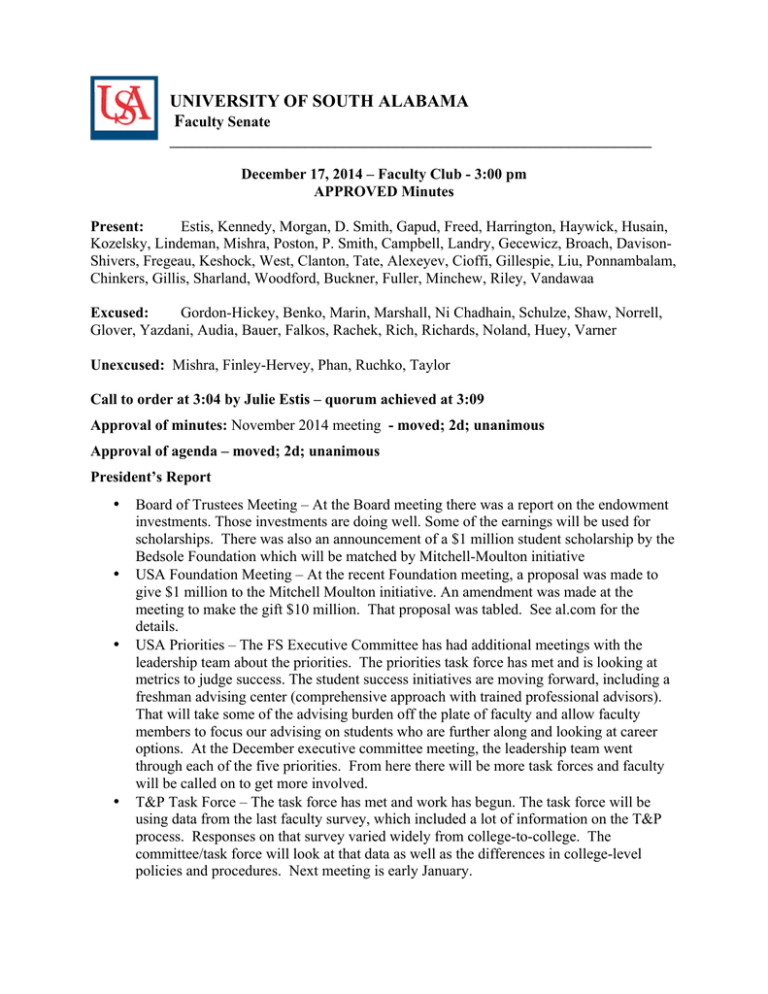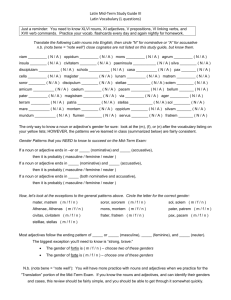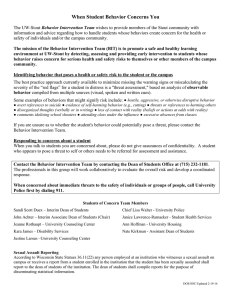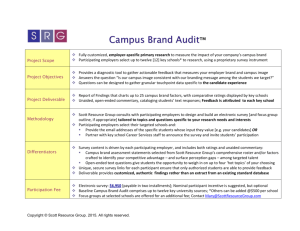UNIVERSITY OF SOUTH ALABAMA F
advertisement

UNIVERSITY OF SOUTH ALABAMA Faculty Senate ________________________________________________________________ December 17, 2014 – Faculty Club - 3:00 pm APPROVED Minutes Present: Estis, Kennedy, Morgan, D. Smith, Gapud, Freed, Harrington, Haywick, Husain, Kozelsky, Lindeman, Mishra, Poston, P. Smith, Campbell, Landry, Gecewicz, Broach, DavisonShivers, Fregeau, Keshock, West, Clanton, Tate, Alexeyev, Cioffi, Gillespie, Liu, Ponnambalam, Chinkers, Gillis, Sharland, Woodford, Buckner, Fuller, Minchew, Riley, Vandawaa Excused: Gordon-Hickey, Benko, Marin, Marshall, Ni Chadhain, Schulze, Shaw, Norrell, Glover, Yazdani, Audia, Bauer, Falkos, Rachek, Rich, Richards, Noland, Huey, Varner Unexcused: Mishra, Finley-Hervey, Phan, Ruchko, Taylor Call to order at 3:04 by Julie Estis – quorum achieved at 3:09 Approval of minutes: November 2014 meeting - moved; 2d; unanimous Approval of agenda – moved; 2d; unanimous President’s Report • • • • Board of Trustees Meeting – At the Board meeting there was a report on the endowment investments. Those investments are doing well. Some of the earnings will be used for scholarships. There was also an announcement of a $1 million student scholarship by the Bedsole Foundation which will be matched by Mitchell-Moulton initiative USA Foundation Meeting – At the recent Foundation meeting, a proposal was made to give $1 million to the Mitchell Moulton initiative. An amendment was made at the meeting to make the gift $10 million. That proposal was tabled. See al.com for the details. USA Priorities – The FS Executive Committee has had additional meetings with the leadership team about the priorities. The priorities task force has met and is looking at metrics to judge success. The student success initiatives are moving forward, including a freshman advising center (comprehensive approach with trained professional advisors). That will take some of the advising burden off the plate of faculty and allow faculty members to focus our advising on students who are further along and looking at career options. At the December executive committee meeting, the leadership team went through each of the five priorities. From here there will be more task forces and faculty will be called on to get more involved. T&P Task Force – The task force has met and work has begun. The task force will be using data from the last faculty survey, which included a lot of information on the T&P process. Responses on that survey varied widely from college-to-college. The committee/task force will look at that data as well as the differences in college-level policies and procedures. Next meeting is early January. • • Adjunct Advisory Committee – Sherrie Cranford will be chair. Discussed pay, full-time employees limitation on teaching load, concern about not feeling part of institution and looking at ways to show loyalty benefits for long-term adjuncts (e.g., small percentage reimbursement on tuition for those who have been with us for a number of years). Will update on that after the group meets again. Mitchell Cancer Institute – will have 3 seats and are in process of having election now. Announcements • Update on Searches – J. Estis *Allied Health is searching for a new dean. The search committee is meeting tomorrow to look at a few preliminary candidates. Using John Hicks – the outside consultant used for the MCOB Dean search. Hoping to have candidates on campus in early February/March with a decision made during spring. Debra Davis is chair. *Executive Committee involved in interviewing candidate for Director of Enrollment Services. Chris Lynch has been interim for @ 2 years; met with him to talk to him about his ideas. Will hear about the conclusion of that process soon. • Research Committee – E. Buckner Asked to be on agenda for 2 reasons: (1) arts/humanities awards winners – Isabel Brown, Claire Page, Christine Eaton, Susan McCready, Justin St. Clair, and Steven Trout. These were reviewed by the research committee. There were many more applicants and we have encouraged those who did not receive an award to apply again by March 1st. Important that we, as a faculty, publicize and brag about these awards. Question from the floor - Is the award open to anyone on faculty or do you have to be in arts/humanities? It can be an interdisciplinary approach. A member of the COM caucus asked for clarification on collaboration by medical faculty. (2) Four “processes” implemented this year. Arts/humanities small grant proposal. Course release to work on grants (must be requested in advance). $25,000 grant announced in summer. Incentives for those who get federal funding. New link on ORED website with correct dates. J. Estis – there was a previous incentive plan for submitting a grant. That program has transitioned to a higher incentive for funding and looking for new ways of compensating those who get grants. A member of the COM caucus asked that when FS members are involved in these discussions that medicine, particularly clinical, is not excluded from initiatives. (3) Faculty Fandango – had 70 attendees. Following the fandango attendees were surveyed about their experience. 97% liked the Wednesday time frame. 94% said they would recommend a fandango to a friend – please do so we can have 140 next time. Most of those who responded to the survey liked the center networking aspect. Majority said they came away with “something”. Received 3 suggestions – roundtables to discuss research results, research symposium, list of attendees being distributed. Suggestion from the floor – speed dating approach to networking. Also suggested that a forum be expanded to off campus participants akin to CoTL. • Handbook Committee – M. Kozelsky The effort to revise the grievance policy is underway. The current policy has problems – crafted in 1980’s by the University attorney and has grown in an ad hoc manner. It discourages grievances. The problem with that is faculty members are almost forced into discrimination or harassment grievances because those are more fully defined. To date the committee has focused on making the policy faculty friendly by revising the purpose, scope, and definitions. The current draft has worked the Ombudsperson into process. The current draft has changed the initiation of the complaint and we are working on a proposed timeline. The two biggest additions the committee is working on – (1) right to advocacy – University has lawyers guiding it but the faculty member has no advocate (something that many of our peer institutions have) and policy expressly excludes reliance on faculty-members who are licensed attorneys; and (2) a form for filing of complaint to initiate the process. We will be working on procedure next semester but wanted to present what we have done to date to give a sense of what is happening and to solicit feedback. It is still very draft form. Recommendation from the floor to make faculty aware of rights when new policy is in place. Currently faculty wait until they are desperate to file and if faculty were aware of policy and timelines, it would help avert problems, including possible problems involving delays impacting faculty legal rights. J. Estis noted that the addition of a University Ombudsperson has helped avert some grievances because things could be worked out informally before issues have reached the point of no return. • University Library Committee – M. Kozelsky – The Dean of the Libraries revealed that the library budget has been stagnant for a while. Budget of the libraries is $1.5 million. $950,000 goes to databases; $200,000 on books and $450,000 on other services. Loss has been coming out of operations. If library does not get an increase in budget, the library will have to take the shortfall out of books. The database costs inflate about 10% per year. Faculty needs to get behind the library to encourage resources. Will talk about the other issues at the January meeting. J. Estis -- we will also put it on an upcoming agenda to discuss with the leadership team. Please send comments/issues to Mara. Old Business None New Business None Guest: Mike Haskins, Director of Marketing and Communication I have only been here for 17 days and appreciate the chance to be here today. I want to talk about my role and what we will be doing going forward. I was in financial publishing in New York before moving into academics at University of San Diego. I started at USA on December 1. During the interview process I heard a lot from constituencies across campus that (1) we are exceptional but (2) not enough people know it. I heard from students repeatedly “I just love South,” but I also heard “I wasn’t really considering coming to South.” They didn’t know a lot about us so that is part of what we need to do – we need to build the relationships. Everyone is involved in marketing. In our department we want to build identity, enhance reputation, create awareness & relevance, and build the university. Brand – what are we promising if someone (student, parent, faculty, community partner) engages with us. Ultimately we need to align brand marketing (our promise) with the bottom line (recruitment, retention, fundraising, engage people with institution). Marketing is all of us working together to move the institution forward and give positive perceptions to those who deal with us. I have been through this process twice – brand, identity, how we communicate – and it has a definite bottom line effect. Branding also has reputational benefits as well. Discussion ensued of the benefits of brand marketing and brand identity. This can not be done by marketing in a vacuum. Need a university-wide discussion about this to come to collective consensus about who we are. M. Haskins wants to facilitate that wide-spread discussion then put together a smaller group to take that feedback to come up with guidelines. Our department bottom line – are we making a difference for the university? We have five priorities the President wants to emphasize. Marketing can help facilitate understanding of and contribution to those priorities and that vision. Q: To whom do you report? A: The President. Q: Are you support for responsible for health side to? A: Yes. One of the things we have talked about is the desire on the campus/university to have a more cohesive expression of who we are which includes the health systems component and the academic affairs component. Need to make connection between health system and university main campus. Q: Is your office responsible for targeted marketing efforts for individual parts of the university? A: yes. For example we have a person responsible for hospital marketing who reports to me. She is part of the central communication operation. She has a “dotted line” connection to hospital administrators. Need your help too. We have to go out and get stories. But we are spread thin. Realistically we need to know when things are happening that we need to be telling the stories about. Let us know about things so we can get the word out. Q: Does the university website vision come from your office? At Department level we are starting to revise using templates, but how much should we be investing time wise if we may get a different direction in the near future? Web services is pretty far down the road on the redesign. While I think marketing needs to be responsible for some of the content and visual presentation, it would not be wise at this point to go in and change all the templates. Will not change dramatically but can do things better, particularly on the home page – need to get a better feeling for what kind of place this is. There are outstanding facilities and they are not featured on website. There were few stories about faculty – research, achievements, work with students – that make the university special. That’s something the prospective students need to know. Need to show rather than tell. Visual media is how prospective students get their information and need to do a better job of that. J. Estis – talked last week about resources for faculty- e.g., templates for faculty to use in presentations, brochures, etc. We are not just here to feed information to media. We are here to provide service to the university. It will be different going forward. Q: Will your office be involved with media? A: Yes. We will provide things to the media that can be used by the media – provide contact to help tell the story of the University. Adjourned – 4:14 p.m. Holiday Social – School of Computing Caucus Report Three academic programs in the School of Computing underwent ABET re-accreditation during the fall. A four-person ABET team visited Shelby Hall in September to evaluate undergraduate degree programs in computer science, information systems, and information technology. A final report is due any day now. The preliminary finding was that a few minor shortcomings needed to be addressed. Longtime faculty member and former Dean David Feinstein retired, effective at the end of the current term. Feinstein has been employed at South since 1980, and completes a 51-year academic career in the computing field. He is noted for national efforts in computing education and model curricula.


